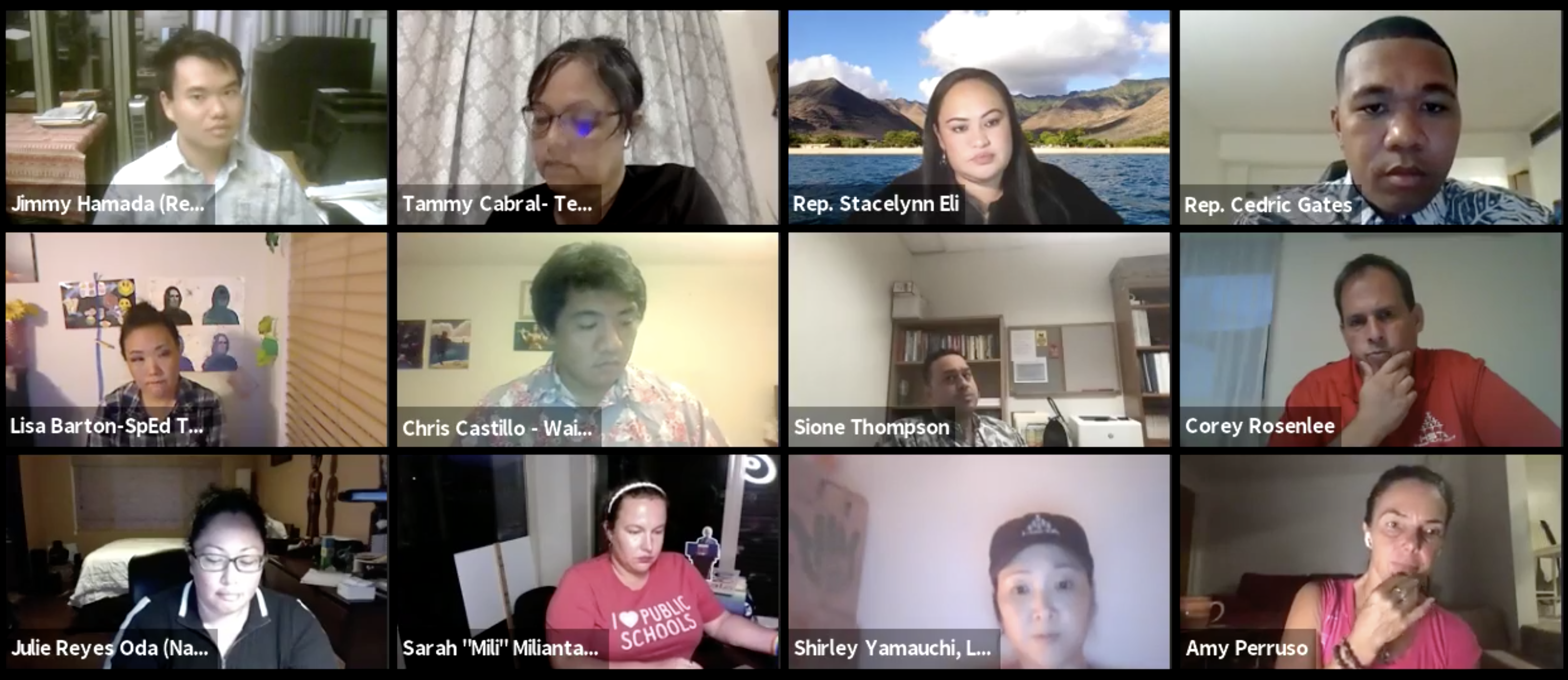Educators who teach along the Leeward coast of Oahu gathered virtually this week to share their stories and concerns with area lawmakers who said they do not support educator pay reductions.
Waianae Intermediate teacher Tammy Cabral organized the event with Rep. Cedric Gates (D, Waianae, Makaha, Maili). Several Hawaii State Teachers Association member leaders took part, along with Rep. Stacelynn Eli (D, Ewa Villages, Honokai Hale, Nanakuli), Sen. Maile Shimabukuro (D, Nanakuli, Maili, Waianae) and Hawaii State Department of Education complex area superintendent (CAS) Sione Thompson. Rep. Amy Perruso (D, Wahiawa, Whitmore Village), a longtime educator, also attended.
Cabral said, “I thought it would be beneficial to do a talk story with our community legislators and others to share the concerns that teachers may have regarding all the mixed messages in our community about students going back to the classrooms with COVID, rising numbers on the coastline, health and safety concerns, furloughs and pay cuts.”
Nanakuli High and Intermediate teacher Julie Reyes Oda said members identified specific questions and goals for the meeting. “The topics we wanted to discuss were health and safety, and furloughs. We also wanted to get commitments from legislators to rally against furloughs and to ask for a monthly meeting with the CAS,” she explained.
More than 100 participants joined the conversation on Zoom, and the event was live streamed on Gates’ Facebook page.
During the discussion, Gates, Eli, and Shimabukuro pledged their commitment to oppose furloughs and pay cuts for teachers.
Shimabukuro said, “I can’t imagine a higher priority than our children, and the job that you folks do is absolutely critical.”
“I can confidently say that we support you,” Eli said. “We’re going to do everything we can.”
Gates said, “We have been resistant to the governor implementing furloughs across the board and we will be going back into session in January, and that’s going to be our time to try to balance the budget and deal with budget shortfalls and see what other opportunities we have to not do the furloughs and find monies to fill those pukas.”
Organizers said many teachers who did not originally plan to speak were inspired to share personal stories related to COVID, and the daily struggle to balance distance learning with in-person instruction.
One teacher said she had to take leave from teaching because her own children were falling by the wayside, and continues to struggle at home. She fought back tears as she asked Thompson, the Nanakuli-Waianae CAS, “Can you consider creating something where teachers or schools have a plan to transition these families, because me and my husband are positive. I have five kids at home, of which helping them with their education is extremely hard right now.
“Getting out of bed, trying to just care for myself and a one-year-old is just really hard, and we’re not getting any support from the school,” the teacher continued, “and I’m not saying it’s not the teacher’s job, but I sit in both hats, teacher and parent. And I’m not saying come to my house and help my kids, but have a little more compassion in place or support system.”
Thompson said, “I can hear in your voice the struggle, and it’s real, and you have some very valid and great points there that have educated me tonight as to some of the points that we need to emphasize and consider.
“I will continue to communicate with the principals to ensure that there’s transparency in the communication and voice from the entire campus, and not just that (school’s COVID response) team,” Thompson added.
For Waianae Elementary teacher Christopher Castillo, the conversation was especially important. “As a medium-high risk teacher after donating my kidney, I wanted to voice my concern for the safety protocols for everyone,” he said.
Following the virtual talk story, HSTA members across the Leeward coast plan to meet regularly with CAS Thompson to continue discussions related to COVID-19 and school response.
“I think hearing from our CAS that we would do more to voice everyone's concerns on the school levels with COVID response teams and an overall crisis team made me feel a little better knowing that those of us on the front lines when the kids come back will have more of a voice and a say, rather than being sent 10 videos to wash hands as trainings,” Castillo said.

